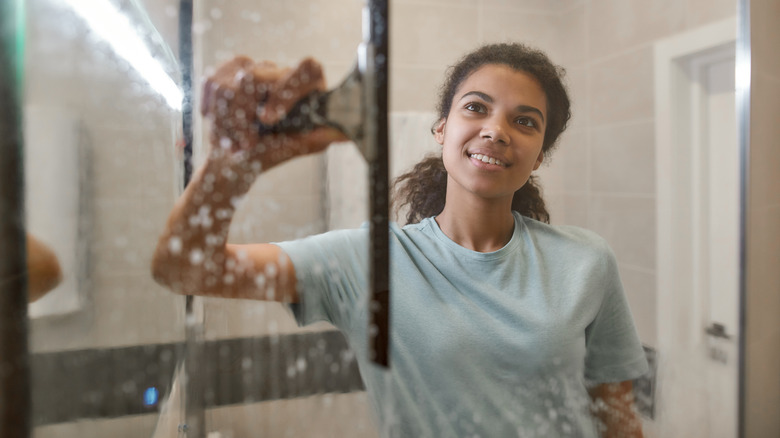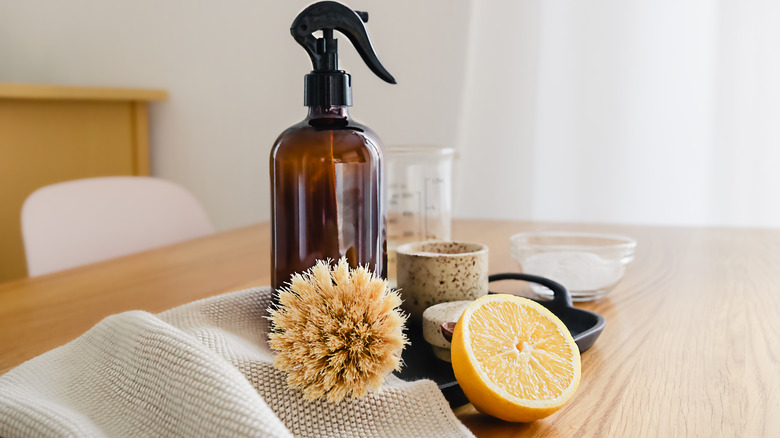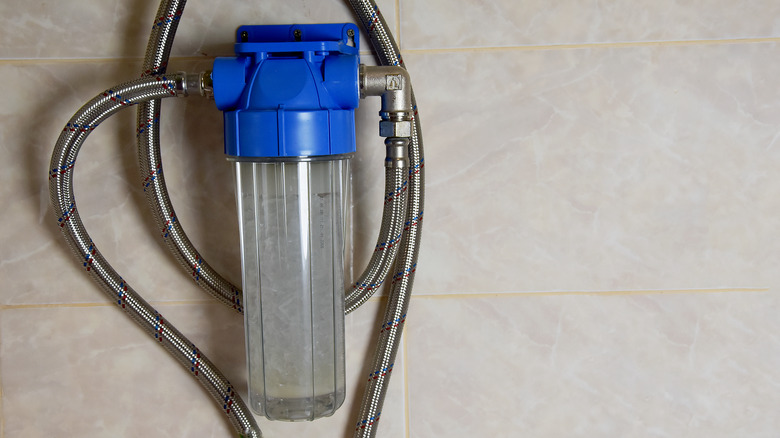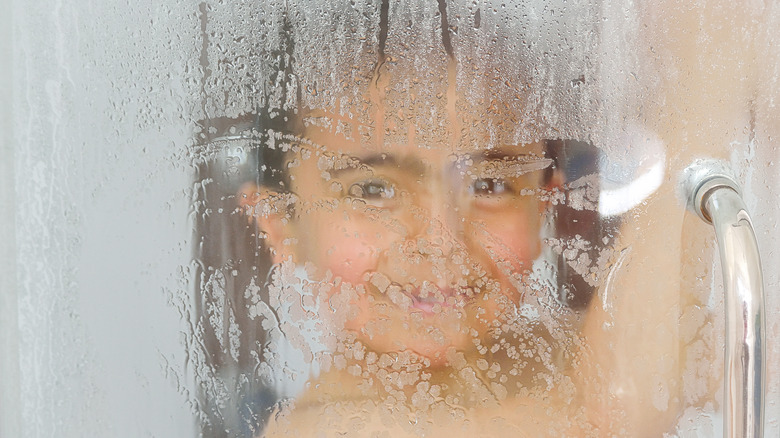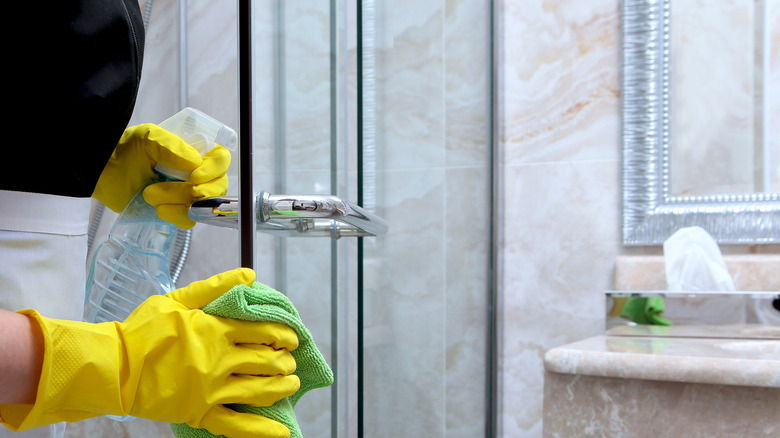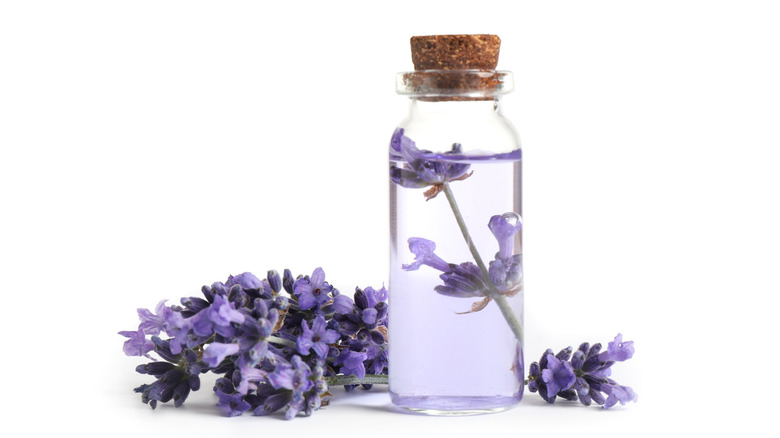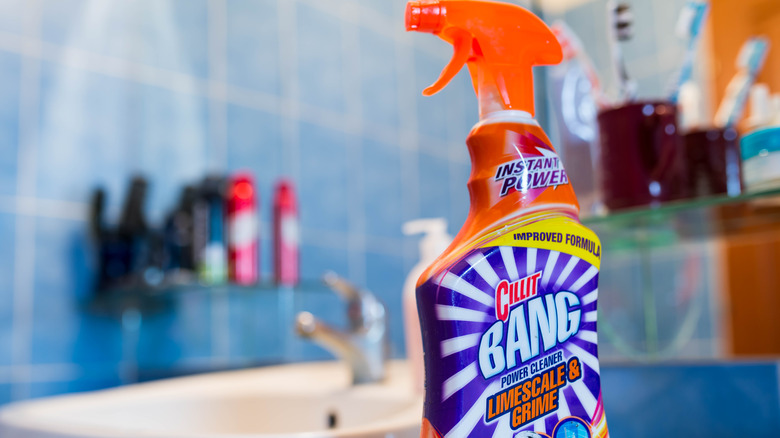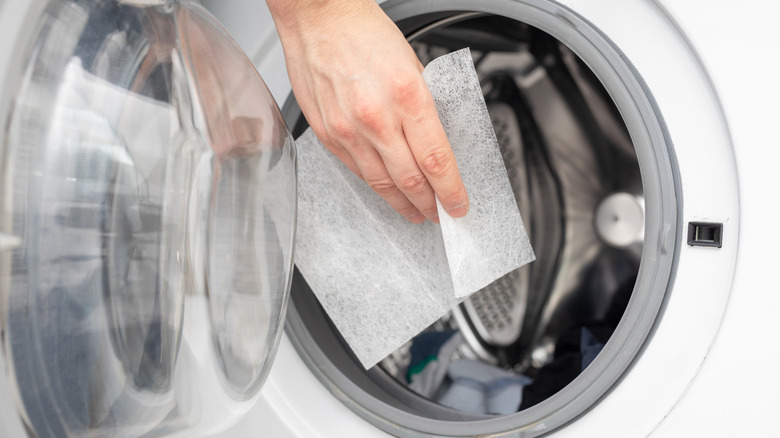8 Easiest Ways To Clean Glass Shower Doors
Nothing feels as good as a warm shower in the morning, but your pleasure in becoming clean might lessen when you look around that shower and see mildew, soap scum, and other residue on those glass doors. Don't fret — the best time to clean your shower is actually right after you grab your comfy bathrobe, according to Better Homes & Gardens. After all, the doors are still wet and all that steam from the hot water makes it easier to dig into that loosened dirt and soap scum — those chalky marks left behind when hard water and bar soap interact (via The Spruce).
To maintain the best upkeep, you should remove any remaining water once you are done with a squeegee or towel. Yep, that means every single time, and you'll avoid those telltale streaks and build-up that dull the glass. If you do this, you'll only need a deep clean every few weeks. Don't despair though: If regular rubdowns aren't your thing, you can also clean your door weekly for similar results, per My Domaine.
Cleaning products for this are plentiful; many are available on supermarket shelves. You also can go the DIY route and clean with things like distilled white vinegar, dish soap, baking soda, table salt, a microfiber rag, or a soft sponge. Vinegar is acidic and can damage stone, so if that sounds like your bathroom, remove that ingredient and opt for homemade cleansers made of baking soda and dish soap instead.
1. Prevent water spots and soap scum marks from forming on glass shower doors
Part of keeping your shower doors sparkling clean comes after each shower, according to Better Homes & Gardens. Get into the habit of cleaning up all those extra droplets that are left after the showering is done, since those build-up and can spot the glass. You can use a squeegee to remove this (available in most bathroom supply stores); some even have suction-cup handles so you don't need to get out of the shower to use it. Or go old school and just use a handy bath towel to dry up all the excess water on the walls and the door.
You can also bring in an after-shower spray into the routine. Many companies make them or you can create your own with a cup of distilled white vinegar, which is non-toxic, blended with a cup of water. Then you can add one tablespoon of dishwashing detergent. After mixing, keep this miracle worker in a bottle with a nozzle. You'll spray the glass after each shower, let it do its magic for a few minutes (say about 30), and then rinse everything off with hot water, conveniently supplied by the shower while you softly scrub with a sponge or microfiber cloth (via The Spruce). If your shower has more streaks than scum, you can opt for a lemon and water combination that should keep your shower doors glistening, suggests My Domaine.
2. Go DIY with the glass cleaner on shower doors
If you are the type that likes stenciling and crafty projects, you'll appreciate making your own cleansers for bathroom purification. One of the best all-around cleaners is distilled white vinegar, and you can use it on many household items successfully, including those dirty shower doors. For one, Better Homes & Gardens suggests mixing some warmed vinegar (heat it in the microwave) with equal parts dish soap. Put the mixture into a spray bottle and you have an effective get-anything-out cleanser. Simply spray the back and front of the door and leave for 30 minutes, then return with a wrung-out sponge and remove whatever remains. Wash out the sponge as needed. Finally, whisk away any remaining water with a microfiber cloth. Additionally, The Spruce suggests a similar formula that combines 1 cup of baking soda with a 1/4 cup of distilled white vinegar. You want to blend it until it becomes a thick paste. If you see it fizzing, don't panic; this is supposed to happen. Apply the paste with a cloth or sponge to the doors. You want to wait 15 minutes or more before removing. Pat dry so no infuriating spots appear.
If the stains are particularly stubborn, you can always add some table salt. Put about 1/2 to 1 cup in a different bowl. Take your sponge/cloth and place it into the baking soda-vinegar mixture first, then touch it to the salt, which will make the cleanser more abrasive.
3. Install a water softener for cleaner glass shower doors
One of the reasons glass shower doors get so much build-up is because of the dissolved minerals — such as calcium, magnesium and limescale — in the hard water that comes from our faucets. Soft water (like rain water, for example) has less of these elements. So, those irritating soap stains, water spots, and lime deposits on your shower doors (and it other places in your home) are all the product of what happens when the minerals of hard water combine with soap.
Water softeners will take away the minerals that hard water contains. Many hotels actually use these to keep their facilities sparkling clean. Besides improving your home, the soft water is better for your skin and hair ... and even your clothes and appliances, which will last longer because of the device, as noted by Aquatell.
Merry Maids points out that one way to combat hard water is by installing a water softener. This might seem like an expensive solution, but in the long run it solves a variety of problems — because those minerals can also show up in your pipes, faucets, dishwasher, shower head, and much more.
4. Make sure to defog glass shower doors
Does your glass continually fog over? This happens to most people since condensation occurs while you are taking a warm shower and the water hits the cool glass. Even if you wipe it with a towel, the frosted-over look quickly reappears, noted The Naked Scientists.
Fortunately, there is a way to solve that: Once you clean your shower thoroughly, spray it with any glass cleaner and dry that with a paper towel. Next, rub a tiny bit of shaving cream over the glass and buff it off, and it should be fog-free for a few weeks (via My Domain). This trick will also work on your mirror and your eyeglasses; shaving cream contains surfactants that leave invisible and protective remnants that changes how moisture latches on to surfaces, making it appear clearer, according to Lifehacker.
Shaving cream also works well as a cleanser. After all, it contains soap, moisturizers, and other protective ingredients, per One Good Thing, and it's good for cleaning an assortment of household items.
5. Only use soft products to avoid scratching your glass shower doors
If you damage your glass doors while cleaning, you've lost the battle of keeping them pristine. Glass is sensitive and using the wrong products etches into the glass — and that's something you can't undo. To avoid this, always look for soft sponges and towels, as well as microfiber cloths, suggests Aquatell.
While scratches cannot be removed completely, you can often lessen their intensity. Deep scratches need professionals to fix, but you still can do much on your own. Advanced Glass Expert recommends running a credit card or some other pliable (but firm) plastic over the scratch — if it catches, call the professionals. If not, you can try an assortment of cleansers, including toothpaste, pumice soap, and metal polish.
Opt for a whitening toothpaste, which has a more abrasive element than the regular variety, and put it on a cloth. Then rub in a circular motion over the etching, and rinse and look at the results. If it's working, repeat. If not, try another ingredient like pumice soap, which also has an abrasive nature. You can put some on a rag or apply it directly. Use a circular motion again and polish the glass, then rinse and see what your success is. If the pumice stone fails you, another option is metal polish, though you need to be careful using this because this product can worsen the situation. So carefully and lightly use this to try to buff any scratches out.
6. Clean your glass shower doors with essential oil
Essential oils such as lemon, lavender, tea tree, and peppermint will help clean your shower. These products come from plants and capture some attribute of the vegetation — say its scent or essence — through distillation or a mechanical method like cold pressing. Then it is mixed with a carrier oil. Such products made through chemical means are not considered "real" essential oils, according to Healthline.
Cleaning with essential oils eliminates the need for bleach and deodorizes your shower with a lovely scent. To use, just dab a few drops onto a cloth or sponge and wipe the shower glass down. You can also mix essential oils with your DIY cleansers. An extra benefit is that using such ingredients will help prevent soap scum from sticking to the glass — and your bathroom will spell heavenly (via Aquatell).
Many essential oils offer other benefits. For instance, cinnamon contains antibacterial, antifungal, and antimicrobial properties; peppermint will help ensure that bacteria won't grow in your bathroom; eucalyptus can purify and disinfect your shower; lemon also has antifungal and disinfecting cleansing agents; and tea tree oil will fight germs, provide disinfection and offer antiviral and antifungal components. Be aware, however, that while essential oils work well for cleansing, they are harmful to pets and you should take care if some spills on your skin. You want to keep those shower door shining, but not at the expense of yourself or your beloved furry friend, per Planted Shack.
7. Use commercial cleaners to make glass shower doors sparkle
Commercial cleaners can remove the grime from your glass shower doors. You want to choose something that works without too much scrubbing, and the product should also be streak-free. So think about the cleanser's form and active ingredients when purchasing. Form is just a fancy word to explain the type of cleaner, such as sprays, foams, and wipes. Some products (like liquids and foams) tackle both small cleanups and bigger jobs because you can adjust how much product you need. Wipes are convenient with their all-in-one cleanser and cloth presentation, but are better for day-to-day maintenance or slight messes.
Certain active ingredients help remove all that bathroom build-up, such as dirt, hard-water residue, and leftover soap. These include ammonia, isopropyl alcohol, oxygen bleach, white vinegar, and citric acid. Some of these (like ammonia) produce fumes that can be irritating or even toxic. Isopropyl alcohol and white vinegar also have strong smells (via Bob Vila). Experiment and see what works for you, and be careful of combining cleaners together. For instance, mixing ammonia with bleach produces a toxic gas, chloramine, which can cause nausea and coughing, according to the Washington State Department of Health.
Keep in mind that some materials need special treatment, such as stone showers. Try to choose products designated for granite or marble. Gently rub the cleanser with a sponge or microfiber cloth, and avoid anything that might scratch these surfaces, per Better Homes & Gardens.
8. Dryer sheets can also clean glass shower doors
Dryer sheets aren't just for your laundry — they can also polish up your shower. All you need to do is take one sheet and moisten it lightly with warm water, then just rub those water spots away, according to HuffPost. This works because softening laundry and cleaning up soap scum both require similar chemicals.
Sometimes the dryer sheet will remove the smudges and dirt entirely, while other times it acts as a loosening agent, and you can apply other methods to take off the remainder. Plus, these little sheets of miracles can clean any bathroom surface marred by residue, like your sink. Once you're finished scrubbing, make sure you rinse off the surfaces with warm water. If you leave any dryer-sheet cleanser behind, your shower door might turn cloudy — and that's not the end goal here, per CHC Glass. Best of all, when you are finished, the dryer sheets leave behind a fresh scent — and if you're looking for something more exotic, you can get that, too. Nowadays, you can find lavender, vanilla, and many other scents available (via The Spruce).

